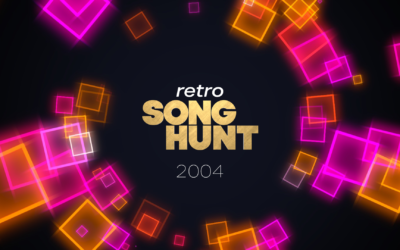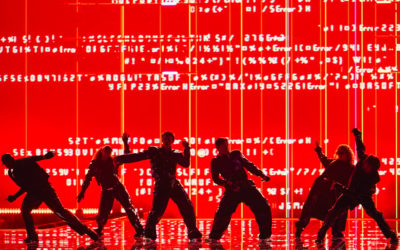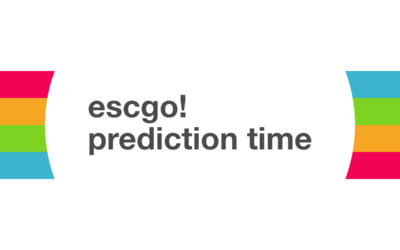Following last week’s article on the Big 5, esc-chat.com’s series introducing and giving a verdict on the ESC 2013 entries continues with the countries of the former Yugoslavia. Martin takes a look at the prospects for Serbia, Croatia, Macedonia, Slovenia and Montenegro.
Looking back
The former Yugoslavia can undoubtedly be described as one of the stalwarts of the “old” ESC. Reflecting its position where East once met West, it took part in the Eurovision Song Contest from 1961 onwards, at a time when it would have been unthinkable for the nations behind the Iron Curtain to do so. And not without success: although it suffered some poor results, even withdrawing from 1977 to 1980, Yugoslavia was a key player in the 1980s and finally got its reward with the victory of Riva’s “Rock Me” in 1989.
This meant that the 1990 contest was hosted in Zagreb. Despite host Helga’s earnest claim that “Yugoslavia is very much like an orchestra”, however, the music emanating from the Balkans was already starting to sound less than harmonious, and it wasn’t long before war gripped the region and Yugoslavia disappeared from the Eurovision map.
The Eastern European nations emerging from the Soviet sphere of influence were understandably keen to join ESC under their own flags, leading to a fundamental shift in the contest from the early 1990s onwards – and the ex-Yugoslav countries were no exception to this. In 1993, a pre-selection was held in Ljubljana to choose three entries from seven would-be participants from the “new Europe”, and indeed it was Slovenia, Bosnia & Herzegovina and Croatia who went forward to make their independent ESC debuts in Millstreet.
In the two decades since then, all six ex-Yugoslav nations have become Eurovision regulars – with varying degrees of success. They can be broadly divided into three categories: the early high-flyers, Slovenia and Croatia, who enjoyed some strong results in the first half of their ESC careers but have regularly struggled to qualify in recent years; the reliable performers, Serbia and Bosnia & Herzegovina, who tend to enjoy consistently good results with the occasional visit to the very top of the scoreboard (most notably Marija Šerifović’s victory in 2007, of course); and poor old Macedonia and Montenegro, who have been plugging away for years without registering too many votes across Europe.
The Bosnians have elected to take a break from ESC this year, but how will the other members of this group of nations fare in Malmö?
The ex-Yugoslav nations in 2013
Serbia finished on the podium at last year’s contest in Baku thanks to the safe hands of Željko Joksimović. This year, however, they have turned their back on the proven “Balkans at ESC” model of gravel-faced people playing Real Instruments while looking very serious. Instead, the trio Moje 3 – consisting of Mirna Radulović, Sara Jovanović and former Junior Eurovision participant Nevena Božović – will bring a youthful, disco-flavoured vibe to the Malmö stage, complete with angel and devil outfits.
“Ljubav je svuda“ is a rare example of an up-tempo number from this particular corner of Europe, and I think it works quite well. The verses are probably stronger than the chorus, and the choreography risks coming across as a little chaotic on camera – but it should be a safe qualifier from last position in the semi-final and, in a ballad-heavy year, a favourable final draw and performance could see it pop its head into the top ten. It probably has too much of a regional-specific flavour to truly cross over, though.
Top 10 |
victory |
personal |
||
 |
 |
 |
Croatia have really struggled in recent years, despite sending local stars like Nina Badrić and… well, Nina Badrić, anyway. They are looking to reverse their fortunes in 2013 by turning to klapa, a hugely traditional form of vocal harmony singing from the Dalmatia region. Klapa s Mora is the name of the group that has been specially assembled to defend the Croatian colours.
With its lyrics about wine, food, love and longing, “Mižerja“ would certainly win any game of Klapa Cliché Bingo. The song is melodically strong and the arrangement effortlessly conjures up the sights and sounds of holidays on the Adriatic coast – and to me, that’s its big strength. While klapa obviously has a highly specific regional flavour, the overall package of music and performance in “Mižerja” is charming in a way that is inclusive rather than alienating, and I can see this really standing out from the crowd in Malmö.
Top 10 |
victory |
personal |
||
 |
 |
 |
If you’ve been following our weekly reviews, you’ll know that Macedonia has encountered all sorts of problems in selecting its entry for ESC 2013. The duo of Esma & Lozano (young gun Vlatko Lozanoski and Romani music legend Esma Redžepova) were originally set to sing “Imperija”. The song was presented on Macedonian TV and all seemed well – until the public expressed its loud dissatisfaction, particularly with the music video and its glorification of the government-backed Skopje 2014 construction project.
Some weeks later, “Pred da se razdeni“ was presented as the new and definitive Macedonian entry for Malmö – and despite Esma’s complaints about being relegated to a mere backing singer role, I think it might actually be a better song. There’s no doubt that “Imperija” was more welcoming to non-Balkan ears, however, and in a semi-final in which Macedonia finds itself separated from most of its voting allies, a repeat of Kaliopi’s qualification from last year seems highly unlikely.
Top 10 |
victory |
personal |
||
 |
 |
 |
Slovenia have experimented with various national final formats in recent years, from the traditional multi-artist EMA contest to the Misija Evrovizija casting show approach which ultimately selected Eva Boto to represent the country in Baku – sadly with little success. This year, broadcaster RTV SLO has opted to go fully internal, nominating the locally-based American singer Hannah Mancini.
“Straight Into Love“ certainly aims to be one of the more modern songs in this year’s contest – the chorus is practically dripping with sidechained synths, almost to the point of distracting from the melody line, and this will be an obvious EuroClub dancefloor favourite in May. Genuinely clubby sounds don’t tend to translate into scoreboard success, however, and I suspect “Straight Into Love” will simply come across as a bit empty and insubstantial on stage. The whole thing gives me Laura Voutilainen vibes, and that’s never a good sign!
Top 10 |
victory |
personal |
||
 |
 |
 |
Montenegro might be punching above its weight on the international football scene at present, but at Eurovision it’s always been knocked out in the first round – although the (kind of) boy band No Name did record an impressive 7th-place finish under the flag of Serbia & Montenegro in 2005. As an independent state, however, Montenegro has yet to make it to the Saturday night grand final. Seeking to rectify that situation this year are hip-hop duo Who See supported by singer Nina Žižić – as usual, an internal selection by the local broadcaster.
“Igranka“ has already clocked up more than three quarters of a million views on YouTube – not bad for a country with a population of 625,000! This suggests that Montenegro can count on strong support from its near neighbours, if nothing else. But will the song catch fire with a wider audience? Personally I think it’s brilliant – bonkers, certainly, but brilliant. However, there’s huge potential for it to be an absolute car crash on stage, and even if everything sits perfectly there’s no denying it’s a difficult entry for the average viewer to find a way into. Still, at least Montenegro haven’t been drawn first in the semi-final for once!
Top 10 |
victory |
personal |
||
 |
 |
 |
The bottom line is that I’m really quite impressed with what the ex-Yugoslav countries have delivered this year – the sheer number of red traffic lights above suggests that none of them are likely to set the scoreboard on fire, but they bring a dose of much-needed diversity to the 2013 line-up.
You can give us your own opinion by voting in the poll on the right-hand side of our website: Which song from the ex-Yugo countries do you like best? The poll will remain open until Thursday morning.
Please note that the judgements on the songs are based on the personal taste of the respective author, and that the predictions made here might be very different to the predictions we make once the rehearsals begin!












0 Comments